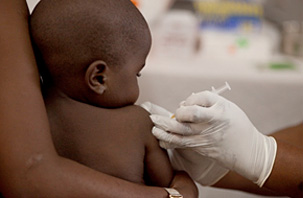- Added 15 May 2013
National Institute for Medical Research (NIMR)
Experience
The National Institute for Medical Research (NIMR) is the largest public health research institution in Tanzania. It was established by the Parliament Act No. 23 of 1979 as a parastatal organization under the Ministry of Health. The establishment of NIMR was in recognition by the government of the need to generate scientific information required in the development of better methods and techniques of enhancing disease management, prevention and control in the country.
NIMR was established with the following functions: (i) to carry out and promote the carrying out of medical research designed to alleviate disease among the people of Tanzania; (ii) to carry out and promote the carrying out of research into various aspects of local traditional medical practices for the purpose of facilitating the development and application of herbal medicine; (iii) to cooperate with the government or any person, or body of persons, in promoting or providing facilities for, the training of local personnel for carrying out scientific research into medical problems; Read more here
Disease areas
- HIV
- Malaria
- Maternal Health
- Other
- Respiratory Diseases
- TB
Other information
NIMR's headquaretrs are in Dar Es Salaam, but it has field sites in Mwanza, Tanga, Bagomoyo, Mbeye, Muhimbili, Tabora and Amani.
e legislation establishing NIMR has vested its governance oversight in the Institute’s Council which operates through three committees, namely Appointments and Disciplinary Committee; Finance and Planning Committee; and Medical Research Coordination Committee (MRCC). The MRCC has a sub-committee known as the National Health Research Ethics Review Committee that oversees ethical issues on submitted health research proposals. The Director General (DG) is the Chief Executive Officer and leads the management team composed of Coordinating Directors at the headquarters and Centre Directors. The Coordinating Directorate are Finance and Administration, Research Coordination and Promotion and Information Technology and Communication.
The Governing Council is responsible for the performance of the functions and management of the affairs of the institute. The Council is made up of a Chairman and twelve members. The Council Chairman is appointed by the President of the United Republic of Tanzania, whereas other Council members are appointed by the Minister for Health. Since 1980, NIMR has had three Director General, Prof. Wenceslaus L. Kilama (1980-1997), Dr. Andrew Y. Kitua (1997-2009) and Dr. Mwelecele N. Malecela (2010 – to date).
Examples of current work include:
Efficacy and safety of artemether-lumefanrine and amodiaquine-artesunate for the treatment of uncomplicated Plasmodium falciparum infection in mainland Tanzania
Evaluation of microbial causes of fever in patients admitted with blood smear negative for malaria parasites at Bombo Regional Hospital, Tanga
Genetics of lymphoedema and Hydrocoele in lymphatic filariasis in Tanzania
Retinoid profiles in Onchocercal Skin Disease-associated morbidity-Cross-sectional field study in Ruvuma Focus Southern Tanzania
Efficacy, Safety and Population-Pharmacokinetics of Artesunate-Mefloquine combination for the Treatment of Uncomplicated Falciparum Malaria in African children versus Artemether-Lumefantrine
ETHICS:
Health research coordination in Tanzania is under the Medical Research Coordinating Committee (MRCC). MRCC is the national health research coordinating body that ensures all health research follows country’s ethics requirements. The Committee functions include coordination of health research conducted in Tanzania. The MRCC has delegated functions of registering, ethical review, approving and monitoring of research to be carried in Tanzania to the National Health Research Ethics Review Sub-Committee (NatHREC).
The day-to-day activities of the MRCC are carried out by the National Health Research Ethics Sub-Committee (NatHREC) established in 2002. NatHREC is responsible for ensuring health research proposals are reviewed to safeguard the dignity, rights, safety and well being of research participants. Institutions carrying out/hosting health research are encouraged to have institutional review committees to safeguard their image by ascertaining the quality of the research output. The Sub Committee is also responsible for overseeing all issues pertaining to health research data and material transfers. Over the years, the Sub Committee has supported a number of research institutions in Tanzania to establish their own Institutional Ethics Review Committees (IREC) or Institutional Review Boards (IRBs).
The whole process of receiving, reviewing and approving the proposals takes 4-6 weeks depending on the responses from the reviewers and the Principal Investigator (PI). NatHREC carries research monitoring by on-site visits in collaboration with district and regional medical authorities. In this regards, copies of certificates of cleared research proposals are sent to respective District and Regional Medical Officers where research is to be carried out. Research certificate approval is renewed annually and PIs are required to submit progress reports biannually. To publish the findings, the principal investigator will have to seek permission from the National Institute for Medical Research. Copies of the final publications must be made available to NIMR and the Ministry of Health and Social Welfare.
Contact this site
To: wanze kohi, Project manager at National Institute for Medical Research (NIMR)
Please Login to contact a site.